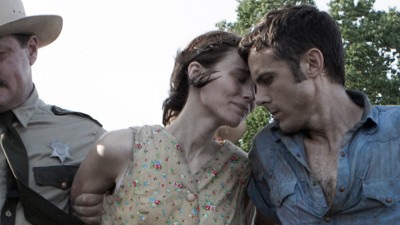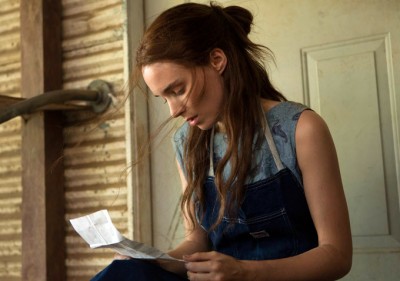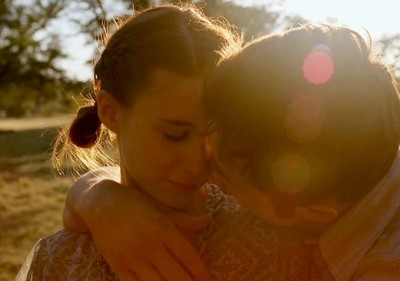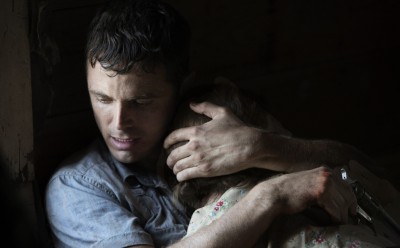
Calling Ain’t Them Bodies Saints the breakthrough film for indie filmmaker David Lowery is probably an overstatement, but it is the film that has pulled him out of the festival circuit with a limited release (read: art-film circuit) by IFC Films. Those who follow these things likely already know that the film has been likened to the work of Terrence Malick — and that’s certainly justified, though the film probably looks more like Robert Altman’s McCabe & Mrs. Miller (1971), even if the tone has more to do with Malick. As a narrative, Lowery’s film is a good deal more accessible than Malick’s more recent work, though it could hardly be called straightforward. It’s dense and more is suggested than stated. This is a fatalist romantic crime drama, and while it is not without its outbursts of violence — sometimes startlingly so — it is not by any definition “action-packed.” It is also an achingly sad film, though not depressingly so.

Casey Affleck stars as Bob Muldoon, a man who — along with his pregnant girlfriend, Ruth Guthrie (Rooney Mara) — gets involved in a robbery that goes wrong and ends with them holed-up in a ramshackle house shooting it out with the cops. Ruth, in fact, wounds one of the cops, Patrick Wheeler (Ben Foster), a crime for which Bob takes the rap, earning him a 25-to-life stretch in prison. While Bob’s imprisoned, Ruth lives with their daughter in a house given to her by the enigmatic Skerritt (Keith Carradine), and Bob dutifully writes to her. Four years have passed when Patrick shows up at her door with the news that Bob has escaped. This is no surprise to anyone — least of all Ruth — but exactly what it will mean remains to be seen, though it clearly means something different to a lot of people.

Perhaps the oddest thing about Ain’t Them Bodies Saints is just how little screen time is shared by Bob and Ruth. It almost goes unnoticed because of the voice-overs of his letters, suggesting a bond that goes far beyond anything we actually see. But the situation is complex. Ruth is as concerned — if not more concerned — for her young daughter as for Bob. Patrick, who holds no grudge over the shooting, is sympathetic, yet is also falling in love with Ruth. There are people who want to help Bob, people who want to catch him, people who want to kill him — and at least one person, Skerritt, whose motivations remain impenetrable.

This is a film that lives on its atmosphere and on what it wants you to feel — with little time to worry about what you think or even necessarily understand. Both Ruthie and Bob are heartbreaking, though the tragic Bob more so. There is no doubt that there can be no happy ending for him. Affleck is touching in his role, because of his seeming inability to do anything besides loving Ruth. It’s a performance I probably wouldn’t have thought he had in him, and yet it’s so grounded in his innocent appeal that it really shouldn’t have surprised me. However, the most interesting performance is that of Keith Carradine. His role as the unknowable — yet authoritative, appealing and slightly terrifying — Skerritt is the kind of thing you carry with you long after other aspects of the film have evaporated. Lowery’s film is not perfect and its dense quality isn’t for everyone, but for the things it does right, and the performances it elicits, it’s still special. Rated R for some violence.
Playing at Carolina Cinemas




This and [i]Side Effects[/i] makes me understand what feels like an insane amount of hype for Mara. I didn’t really get it during [i]Dragon Tattoo[/i], but she really impressed me in this one. Makes me hope they just ditch the series, but that probably won’t be happening.
It’s odd that they haven’t, since the box office on the Swedish movies (not to mention critical response) dropped on the two sequels. But I guess if you’re looking at a $90 million movie that had a worldwide gross of $240+ million, indicating a nifty profit of about $50 million…
Never really caught on here and on Friday, it won’t be here.